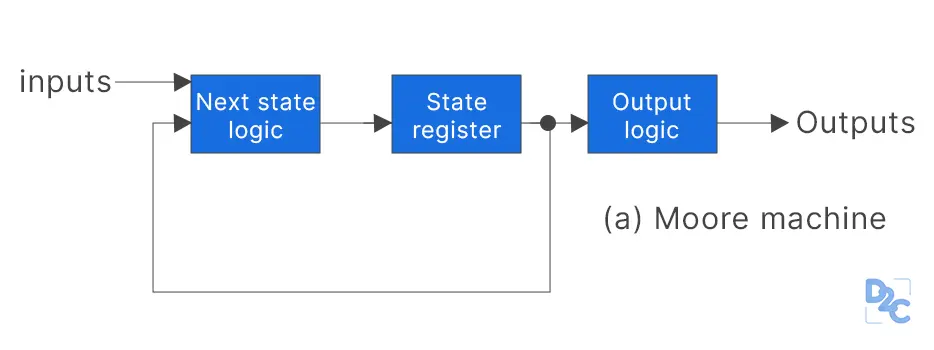What is a Moore machine?
A Moore machine is a finite-state-automata where the output values are determined by only its current state. Moore machines are a restricted type of a finite-state-transducer.

Mathematical model
As per the general classification noted on UC Davis outline on transducers (formatted with similar variables to [[Finite-state automata]]s), a deterministic Moore machine has 6 main variables associated with its definition (a sextuple): (Σ, S, Γ, δ, ω, s0).
- Σ is the input alphabet (a finite non-empty set of symbols) -> our events;
- S is a finite non-empty set of states;
- Γ is the output alphabet;
- δ is the state-transition function: δ:S×Σ→S
- ω is the output-transition function: ω:S→Γ
- s0 is an initial state, an element of S; and
- δ⊆S×(Σ∪{ϵ})×(Γ∪{ϵ})×S (where ε is the empty string) is the transition relation.
Given any initial state in s0, to transition our state to the next state with our output alphabet, our transition would be:
δ:s0×Σ→S
ω:s0→Γ
Examples of basic Moore machines
Unlike a Mealy machine, we can't coalesce the transition and output functions together as a single transition function. The behavior of the output function is synchronous to the state change. As such, we end up with something like this (in Rescript):
type trafficLightStatus =
| Red
| Amber
| Green
| FlashingRed
type input =
| ExpireTime
| Error
| Restart
type outputFn = (state) =>
switch (state) {
| Red => (Red, 60.0)
| Green => (Green, 60.0)
| Amber => (Amber, 60.0)
| FlashingRed => (FlashingRed, 30.0)
}
let transitionFn = (state, input) =>
switch (state, input) {
| (Red, ExpireTime) => Green(60.0)
| (Red, Error) => FlashingRed(30.0)
| (Green, ExpireTime) => Amber(60.0)
| (Green, Error) => FlashingRed(30.0)
| (Amber, ExpireTime) => Red(60.0)
| (Amber, Error) => FlashingRed(30.0)
| (FlashingRed, Restart) => Red(60.0)
| _ => state
};
let output = outputFn(transitionFn(Red, ExpireTime)) // (Green, 60.0)
Differences between
With formal [[Finite-state transducer]]s
Moore machines are a type of generator and are not used in processing natural language. As such, they do not have a concept of a final state.
With [[Mealy machine]]s
Both Mealy and Moore machines are generator-type state machines and can be used to parse regular language. The outputs on a Mealy machine depend on both the state and inputs, whereas a Moore machine have their outputs synchronously change with the state.
Every Moore machine can be converted to a Mealy machine and every Mealy machine can be converted to a Moore machine. Moore machine and Mealy machine are equivalent.
